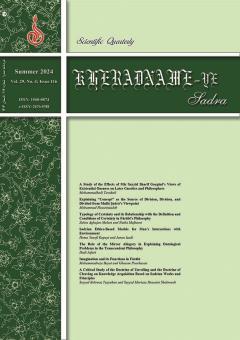Typology of Certainty and its Relationship with the Definition and Conditions of Certainty in Fārābī’s Philosophy
Subject Areas : مطالعات حوزه فلسفه و حکمت اسلامی
Zahra Aghajan Molaei
1
*
![]() ,
Nadia Maftouni
2
,
Nadia Maftouni
2
![]()
1 - MA in Islamic Philosophy and Kalam, University of Tehran, Tehran, Iran
2 - Professor at the Islamic Philosophy and Kalam Department, University of Tehran, Tehran, Iran
Keywords: Certainty, absolute judgment, conformity with reality, belief, fixity, idea, sufficiency, Fārābī,
Abstract :
Philosophy is based on certain knowledge, and Fārābī, as the founder of Islamic philosophy, paid particular attention to “certainty”. On the one hand, the definitions and conditions that he provided for certainty are so fastidious and restrictive that many items of human knowledge and even sense perceptions are placed out of the domain of certainty. On the other hand, he has referred to some different types of certainty in some of his works that seem to be incompatible with his definition of certainty and its conditions of realization, as explained by him. Following a descriptive and critical-analytic method, this paper is intended to inquire into the relationship between the typology of certainty, its definition, and its conditions in Fārābī’s philosophy in order to remove the contradictions regarding the problem of certainty in his school of thought. In line with this purpose, the authors have initially examined the definitions and conditions of certainty in Fārābī’s perspective and then analyzed the types of certainty, as specified by him, and its relationship with the definitions and conditions that he provided. The findings of this study demonstrate that his realistic view of certainty led him to accept a kind of general gradation in different types of certainty, alongside his rigid definition of absolute certainty, in order to introduce a way for saving a great part of human knowledge from the trap of skepticism.
ابنعربی، محییالدین (۲۰۰۴م) «کتاب الیقین»، در رسائل ابنعربی، تحقیق سعید عبدالفتاح، بیروت: مؤسسة الإنتشار العربی.
ابنفارس، احمد (۱۴۰۴ق) معجم مقاییس اللغة، قم: مکتب الاعلام الاسلامی.
ابنمنظور، محمدبن مکرم (۱۴۱۴ق) لسانالعرب، بیروت: دار صادر.
پورحسن، قاسم (۱۳۹۷) خوانشی نو از فلسفه فارابی، گسست بنیادین معرفتی از سنت یونانی، تهران: نقد فرهنگ.
جوهری، ابونصر اسماعیلبن حماد (۱۴۰۷ق) الصحاح تاج اللغة و صحاح العربیة، بیروت: دارالعلم الملایین.
رضایی، مرتضی (۱۳۸۳) «هویتشناسی یقین»، معرفت فلسفی، شمارۀ 6، ص 60ـ29.
سجادی، سیدجعفر (1373) فرهنگ معارف اسلامى، تهران: دانشگاه تهران.
طوسی، خواجه نصیرالدین (۱۳۶۷) اساس الاقتباس، تهران: دانشگاه تهران.
عباسزاده، مهدی (۱۳۹۶) «یقین در تفکر فارابی»، ذهن، شمارۀ ۷۰، ص64ـ33.
فارابی، ابونصر محمد (۱۴۰۸ق) المنطقیات، قم: کتابخانه آیتالله مرعشی نجفی.
فارابی، ابونصر محمد (۱۳۶۴) فصول منتزعه، تهران: الزهرا.
فارابی، ابونصر محمد (۱۴۱۳ق) الاعمال الفلسفیة، تحقیق جعفر آل یاسین، بیروت: دار المناهل.
فارابی، ابونصر محمد (۱۸۹۰م) الثمرة المرضیة فی بعض الرسالات الفارابیة، بیجا: نشر دیتریصی.
فارابی، ابونصر محمد (۱۹۹۶م) احصاءالعلوم، بیروت: مکتبة الهلال.
فراهیدی، خلیلبن احمد (۱۴۰۹ق) کتاب العین، قم: هجرت.
محمدزاده، رشید (۱۳۹۶) بررسی تحلیلی بنیادهای معرفتشناسی فارابی، رساله دکتری گروه فلسفه، دانشگاه علامه طباطبائی.
مفتونی، نادیا؛ تواناپناه، فتانه (۱۳۹۶) «جایگاه یقین در صناعات خمس نزد فارابی»، خردنامه صدرا، شمارۀ ۸۹، ص64ـ53.
ملاصدرا (۱۳۶۲) منطق نوین مشتمل بر اللمعات المشرقیة فی الفنون المنطقیة، تهران: آگاه.
ورزدار، کرامت؛ فرامرز قراملکی، احد؛ کشفی، عبدالرسول (۱۴۰۰) «بررسی و مقایسه آرای ارسطو و فارابی در مسئله خطای حسّی»، فلسفه و کلام اسلامی، سال 54، شمارۀ 1، ص246ـ227.

